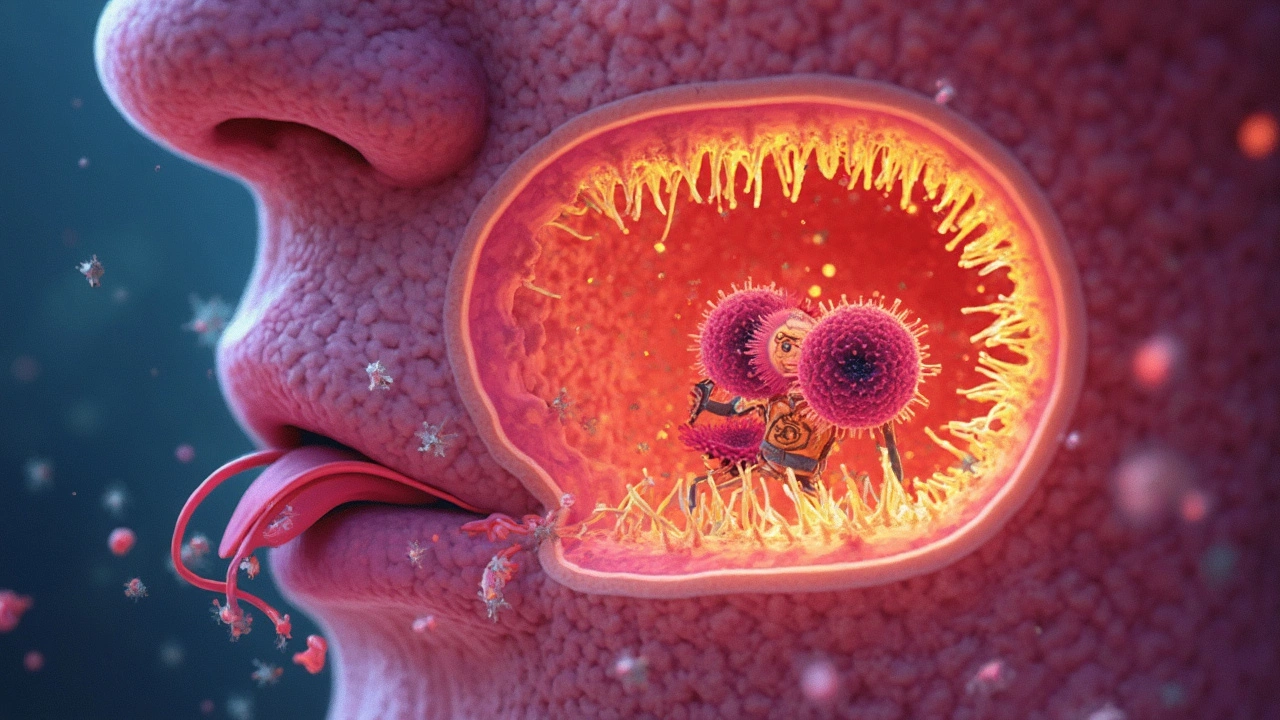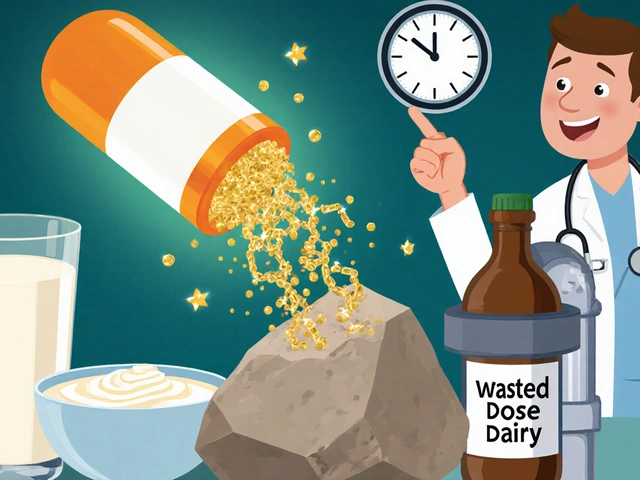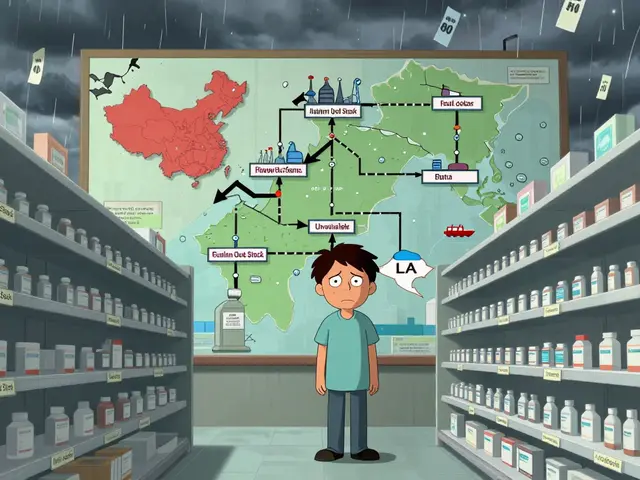How Pharyngeal Mucous Membranes Guard Against Infection

Ever wonder why your throat doesn’t get infected every time you breathe in dust, smoke, or someone sneezes nearby? It’s all about those hardworking pharyngeal mucous membranes. They do a lot more than just keep your throat moist—they’re your first line of defense against invaders like bacteria and viruses.
Right now, a thin layer of mucus is trapping dirt and germs before they get a chance to take over your body. Cilia, tiny hair-like structures, actually move that gunk out so you can either cough it up or swallow it (yeah, a bit gross, but super effective). If you’ve ever noticed your throat feeling scratchy after a long day outside, that's your mucous membranes going to work, catching all the junk you’ve inhaled.
What’s wild is this system runs non-stop, whether you’re awake or asleep. But it’s not indestructible. A dry room, smoking, or even mouth breathing at night can mess with it. Taking care of those mucous membranes isn’t just about being comfortable—it can actually mean fewer sore throats, less coughing, and a lower chance of getting sick.
- What Are Pharyngeal Mucous Membranes?
- How Mucus Stops Germs
- Cells and Chemicals in Action
- When Defenses Weaken
- Tips to Keep Your Throat Defenses Strong
What Are Pharyngeal Mucous Membranes?
Let’s get straight to it: pharyngeal mucous membranes are thin layers of tissue lining your pharynx, or throat area. They aren’t just sitting there—they’re loaded with glands that pump out mucus 24/7. That mucus isn’t just for show. It acts like a sticky shield, grabbing dust, bacteria, and viruses before they can get any deeper into your body.
You’ll find these membranes lining the back of your nose and mouth, stretching down to where the windpipe and food pipe split off. They’re made of several cell layers, including special cells that produce mucus, and others that help move all that trapped gunk away from your airway.
Here’s what’s cool—your pharyngeal mucous membranes aren’t just a passive surface. They have immune cells, like white blood cells, that can actually spot and attack germs on the spot. It’s like having your own in-house security team for your throat. The combination of a physical barrier, mucus (which acts a bit like flypaper), and these active immune cells means a huge chunk of germs never make it past your pharynx.
Here’s a quick breakdown of what they do for you every day:
- Trap airborne germs and particles your nose or mouth takes in
- Keep your throat moist, so the membranes don’t dry out and crack
- Support immune defense by housing special immune cells
- Help healing if your throat gets scratched or infected
If you laid them all out, these membranes would easily cover a few square inches, but their role is always bigger than their size. Issues like allergies, dry air, or smoking can damage them, and when they’re worn down, it’s way easier for infections to sneak through. So keeping your pharyngeal mucous membranes healthy is one of the easiest ways to help your body fight off sickness.
How Mucus Stops Germs
You might think mucus is just gross stuff you cough up when you’re sick, but it’s actually a powerful shield. In your throat, pharyngeal mucous membranes produce a sticky, slimy layer that traps germs, dust, and pollen the second they enter. This barrier completely covers your throat wall and catches things you’d rather not have in your body—even before your immune system kicks in.
The secret weapon here is how this mucus works with cilia, those tiny hairs lining your throat. The cilia are always moving, like a crowd at a concert, waving particles and trapped germs upward or toward your stomach. Once swallowed, stomach acid destroys most of the invaders. Without this system, every breath would risk infection.
Here’s what you’ll find in the mucus itself:
- Water—Keeps everything moving and stops your throat from drying out.
- Mucins—The proteins that give mucus its sticky power, binding up viruses and bacteria like glue.
- Antimicrobial peptides—Tiny fighters that break down bacteria cell walls.
- Enzymes, like lysozyme—These break up some germs right on the spot, before they can do any harm.
In a clinical study published by the American Journal of Rhinology & Allergy in 2022, researchers found that healthy mucus can trap and remove about 90% of inhaled bacteria before they reach deeper airways. That’s a huge deal for infection prevention. Smokers, though, had way less effective mucus—showing why habits matter so much.
The bottom line: strong, healthy mucus lets your pharyngeal mucous membranes act as nature’s germ filter every time you breathe, eat, or even talk. Take care of it, and it’ll take care of you.

Cells and Chemicals in Action
Your pharyngeal mucous membranes are so much more than just a layer of slime. There’s a full crew of specialized cells and nifty chemicals working behind the scenes, kind of like a SWAT team for your throat.
First up are goblet cells. They’re the main ones pumping out mucus, which traps germs, dust, and other stuff that could make you sick. Think of mucus like flypaper for bacteria and viruses.
You’ve also got immune cells—mainly white blood cells—hanging out just under the surface. When they spot trouble in the mucus, like a virus or bacteria, they jump into action. Neutrophils and macrophages are the heavy hitters here. They literally gobble up invaders and break them down.
Chemicals get involved too. Lysozyme is a superstar enzyme found in the mucus. What does it do? It zaps the walls of certain bacteria, busting them up before they even get close to your body’s deeper tissues. There’s also secretory IgA, which is an antibody that spots and neutralizes viruses and bacteria trapped in the mucus, like a bouncer tossing troublemakers.
Want a quick look at who's doing what? Check out this breakdown:
| Cell/Chemical | Main Job |
|---|---|
| Goblet Cells | Produce mucus to trap germs |
| Neutrophils & Macrophages | Swallow and destroy invaders |
| Lysozyme | Breaks down bacterial walls |
| Secretory IgA | Blocks viruses and bacteria |
This teamwork works fast. Bacteria can get trapped and neutralized in less than a minute. All these pieces help your pharyngeal mucous membranes stop infections before they even get started. Keeping these cells and chemicals working their best is the real game changer if you want a healthier throat and a stronger body overall.
When Defenses Weaken
The pharyngeal mucous membranes are tough, but not unbeatable. Things like dry air, allergies, smoking, dehydration, and even some medications can mess up your mucous layer, making it easier for germs to sneak through. For example, spending lots of time in heated rooms during winter can dry you out fast. Antihistamines and decongestants might clear your nose, but they also zap moisture from your throat, making those membranes less protective.
If you smoke—whether it’s cigarettes or vapes—your cilia slow way down, and mucus production takes a hit. This means dirt, viruses, and bacteria hang around longer, bumping up your risk for throat infections, coughs, and even long-term damage. People with seasonal allergies also fight an uphill battle. Their immune system keeps firing, which inflames the membranes and can break down their usual barriers.
Ever noticed your throat hurts more when you’re run down? Stress can actually lower your body’s general immune defense, which includes your throat’s frontline. That’s also why folks with chronic illnesses, like diabetes, or who are undergoing chemotherapy, are more likely to get throat infections—because their natural barriers are weakened.
| Risk Factor | Effect on Mucous Membranes |
|---|---|
| Dry Air/Heating | Dries out mucus, making it less sticky and less effective |
| Smoking & Vaping | Kills cilia and reduces mucus quality |
| Allergies | Causes swelling and breaks down defenses |
| Medications (e.g., antihistamines) | Decrease moisture, making throat more vulnerable |
| Illness & Stress | Weaker immune response overall |
You’ll know your throat health is struggling when you start getting sore throats easily, coughing up more phlegm, or dealing with frequent infections. The good news? By catching these issues early and tweaking your daily habits, you can give your pharyngeal mucous membranes a fighting chance again.

Tips to Keep Your Throat Defenses Strong
Keeping your pharyngeal mucous membranes healthy means fewer infections and easier breathing. It’s not complicated, but skipping the basics can really knock your throat’s defenses down.
- Stay hydrated: Water keeps mucus thin and slippery, making it easier for your throat to trap and move out germs. If you wake up with a dry mouth, try a glass of water before bed or keep one on your nightstand.
- Avoid dry air: Use a humidifier in your bedroom, especially in winter or if you run the heat a lot. Dry air thickens mucus, making it less effective at catching viruses and bacteria.
- Don’t smoke—at all: Cigarette smoke destroys the cilia in your throat and dries out the mucus. If you live with smokers, try to avoid secondhand smoke too—the effect is almost as bad.
- Breathe through your nose: Your nose actually filters and moistens air before it hits your throat. Mouth breathing dries things out and lets more germs get past.
- Wash your hands often: It’s kind of obvious, but handwashing keeps germs from getting in your mouth, nose, or eyes, which all connect to your throat.
- Avoid too much alcohol and caffeine: Both can dry out your mucous membranes. Swap that extra cup of coffee or beer for water once in a while.
- Watch your allergies: Allergies can inflame your throat and mess with normal mucus. Controlling allergy triggers actually helps your throat’s natural defense work better.
If you want some eye-opening data, check this out:
| Habit | Infection Risk Increase |
|---|---|
| Smoking | Up to 2x |
| Not hydrating | 1.5x |
| Dry indoor air | 1.8x |
Sticking to these habits really makes a difference. Anyone can support their throat health—it just takes a bit of attention to daily routines.






Adam Martin
April 28, 2025 AT 14:56Oh sure, because we all just love waking up to a throat that feels like a dusty attic, right?
But seriously, the pharyngeal mucous membranes are the unsung heroes that keep us from turning into walking petri dishes.
They’re constantly churning out mucus, which is basically the body’s own low‑tech air filter.
The cilia are like tiny janitors, sweeping debris out of the airway before you even notice a tickle.
When you’re in a dry office, those membranes dry out faster than a forgotten soda left on a windowsill.
That’s when the whole system starts whining, and you end up with that scratchy, “I‑don’t‑like‑this‑thing‑in‑my‑throat” feeling.
Hydration is the cheapest ticket to keeping that mucus the right consistency – think of it as oil for the cilia.
Smoking, on the other hand, is basically a chemical sabotage mission against your own defenses.
It slams the brakes on ciliary motion and turns the mucus into a sticky mess that traps germs instead of sending them out.
Even mild dehydration can make that mucus thicker than a bathtub plug, giving microbes a free ride deeper into the lungs.
And let’s not forget the immune cells lurking just beneath the surface, ready to pounce on any unwelcome invader that slips past the mucus.
They’re the real security detail, not just decorative wall art.
All that said, you don’t need a PhD to keep these membranes in top shape – drink water, use a humidifier, and stop lighting up.
Also, breathing through your nose instead of your mouth adds an extra layer of filtration, because the nose is literally designed for that.
Finally, a quick habit: keep a glass of water by your bedside; it’s the simplest way to avoid waking up with a desert‑like throat.
Bottom line: your pharyngeal mucous membranes are the quiet workhorses of respiratory health, and they deserve a little TLC.
Ryan Torres
April 28, 2025 AT 16:20Listen, the whole "just drink water" spiel is a distraction from the real agenda – Big Pharma wants us to believe mucus is harmless so they can push those synthetic decongestants that actually strip away our natural defenses 😡💊. They've been spraying nano‑particles into the air for years, and what do we get? A population that can’t even produce decent mucus without a prescription! 🤬🦠 The truth is, the chemicals in cigarettes and even e‑cig vapor are deliberately engineered to cripple cilia, making us more dependent on their “miracle” cough syrups. Stay woke, stay hydrated, and don’t trust the mainstream health advice. 😤🚫
shashi Shekhar
April 28, 2025 AT 18:00Yeah, right, as if anyone actually reads these half‑baked conspiracy threads.
I mean, sure, keep your throat moist, but don’t act like the government is plotting to turn our mucus into a mind‑control serum.
Honestly, I’m too lazy to even fact‑check this, but if I had to pick a favorite, I’d say the “dry air kills you” scare tactic is probably the most believable.
At the end of the day, just keep breathing, maybe don’t smoke, and stop over‑thinking a thing that’s basically just slime.
Marcia Bailey
April 28, 2025 AT 19:40Great info, everyone! 😊 Just wanted to add a quick tip: try adding a pinch of sea salt to your water – it can help keep the mucus layer a bit more hydrated. Also, a simple humidifier set to around 40% humidity works wonders during winter. Keep those membranes happy and you’ll notice fewer sore throats. 🌿💧 Stay healthy!
Hannah Tran
April 28, 2025 AT 21:20Appreciate the supportive vibe, Marcia! 🚀 To build on that, let’s talk about the secretory IgA – a crucial immunoglobulin that coats the mucosal surface and neutralizes pathogens before they even think about breaching the epithelium. It’s part of the mucosal‑associated lymphoid tissue (MALT) system, which is basically the first line of adaptive immunity in the airway. Ensuring adequate vitamin A intake can upregulate IgA production, so don’t skip those carrots! And yes, while we’re being friendly, remember that chronic exposure to airborne irritants can downregulate this defense, leading to increased susceptibility. Stay aggressive in protecting your mucosa, folks!
Crystle Imrie
April 28, 2025 AT 23:00Honestly, this is all overblown.